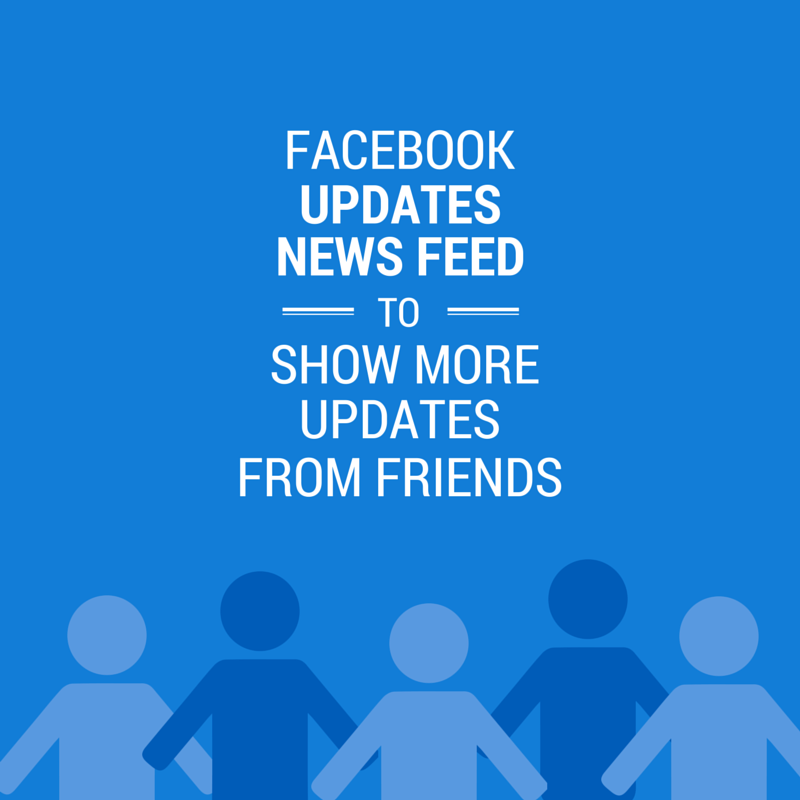Facebook Updates News Feed to Show More Updates From Friends

Over the last few years, we’ve seen Facebook’s organic reach slowly dwindle for the average Facebook Business Page. Facebook has updated its News Feed algorithm once again to show more updates from users’ friends. For businesses, this may bring us closer to 0% organic reach on our pages. Yikes!
When Business Pages were first released in May 2009, businesses had a powerful opportunity to share content and get it seen by followers. Over the last six years, however, we’ve seen that organic reach (free reach) dwindle down as pages share more and more content, and as Facebook builds out its advertising revenue streams.
In the April 21st announcement, Facebook mentioned three new updates that will change the way content is posted on the News Feed and warns businesses that “posts reach and referral traffic could potentially decline” as result of these updates.
1st Update: The first centers on users who don’t have a lot of content to see. Prior to the update, the algorithm ensured people were not shown multiple posts from the same source in a row. Facebook has adjusted this measure for users who do not follow a lot of people and therefore do not see a lot of content. Not a big deal, impacts should be minimal for this update.
2nd Update: However, the second update is a big deal. According to Facebook’s announcement, this update, “tries to ensure that content posted directly by the friends you care about, such as photos, videos, status updates or links, will be higher up in the News Feed so you are less likely to miss it. If you like to read news or interact with posts from pages you care about, you will still see the content in the News Feed. This update tries to make the balance of content the right one for each individual person.”
Facebook will basically use your past behavior as a guide to build out a custom News Feed that will feature content posted by friends you regularly interact with, ensuring their posts appear more prominently on your News Feed. This will impact page posts because it will increase the preference metrics of what’s seen on one user’s page verses another user’s page. If a person is more likely to see content from friends, they’re less likely to see posts from pages on a daily basis.
3rd Update: Finally, the third update relates to posts that users’ friends have liked or commented on. Facebook mentions that, “many people have told us they don’t enjoy seeing stories about their friends liking or commenting on a post. This update will make these stories appear lower down in News Feed or not at all, so you are more likely to see the stuff you care about directly from friends and the pages you’ve liked.”
Much like the other updates, it’s hard to predict if this third update will make a real impact. It does seem like ‘likes’ don’t hold value as much as they did before for a post. The update implies that interactions such as likes or comments aren’t necessarily going to increase your post reach. This update puts more emphasis on shares and on users to take action to promote content on your page.
The Key Takeaway
What does this mean for Facebook marketing? These three new changes to the News Feed algorithm means brands need to move from a broadcast focus to making themselves part of the conversation. Facebook is going to show users what they’re individually interested in. The only way to effectively promote your page as a business without moving over to paid advertising on the social network is to generate conversion by creating great content, listening to your audience, and responding to your audience accordingly in order to attract more direct interactions and conversations from individuals.
It’s clear that the update doesn’t help Facebook marketers and further supports the possibility we may be seeing zero organic reach in the future! Facebook does mention that “media content is a key part of the experience for people on Facebook” and that they are “committed to helping publishers find the right audience for their content.” What are your thoughts on these latest updates to the News Feed? Has Facebook helped you reach your audience in the past?
